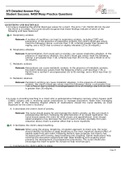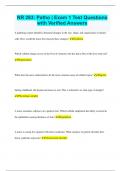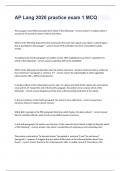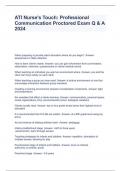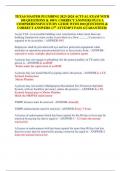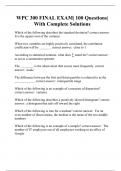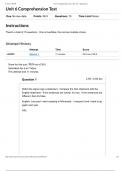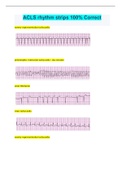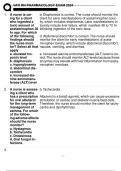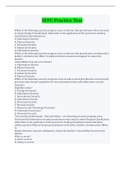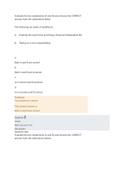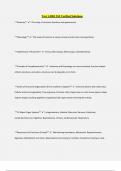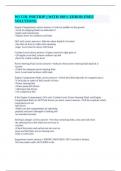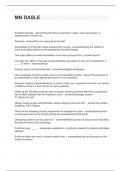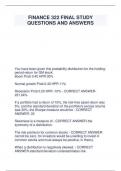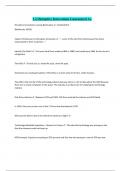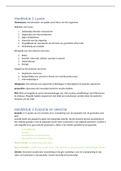RECHTSPSYCHOLOGIE
LES 1: MYTHES IN DE RECHTSPSYCHOLOGIE
Praktisch: wat moet je kennen?
o Colleges!
o Artikelen (Engels/Nederlands) → ook indien niet behandeld in college
o Video’s/filmpjes: kernaspecten
o Onderzoek
o Vragen kunnen ook Engels zijn + oefenvragen tijdens colleges
o Geen cursus, alles komt op Toledo
o Examen: meerkeuze met giscorrectie
Criminological Experimental Legal Psychology lab = CELL
o Visie: onderzoek, onderwijs, training, zaaksonderzoek voor de rechtbank, politie, etc
Onderwerpen
→ Betrouwbaarheid van verklaringen
→ Ondervragingsmethoden
→ Trauma en verklaringen
→ Cognitieve biases: valkuilen waar je slachtoffer van kan zijn
o Vb. onbedoelde druk van buitenaf: mensen zijn hier vatbaar voor waardoor de zaak
op een andere manier bekeken kan worden
Rechtspsychologie = onderzoek naar fenomenen die relevant zijn in de rechtbank
- Geheugen
- Liegen
- Wat allemaal een rol speelt bij professionals (bv politie, rechters, advocatuur,…)
- Op basis van experimentele psychologie: vb. geheugen
- Op basis van empirisch en veldonderzoek
- Vb. geheugen, ooggetuigenidentificatie (getuigen waar 1 verdachte tussen zit en moet
aangewezen worden), leugendetectie
Forensische psychologie
- Op basis van klinische psychologie: vb. psychopatrie (therapeutische kant hiervan is
belangrijker)
- Op basis van empirisch en veldonderzoek
- Vb. persoonlijkheid, PTSS, recidivisme, behandeling
Criminologische psychologie
- Wordt internationaal bijna nooit meer gebruikt
- Heel veel raakvlakken met rechtspsychologie
1
,Rechtspsychologie vs. forensische psychologie
➢ Geheugen en tijd zijn geen goede vrienden
Actueel
o Toename van zaken dat mensen (vermeende slachtoffers) heel veel jaren geleden claimen
misbruikt te zijn geweest: wat kan jij je nog herinneren? Hoe betrouwbaar is deze verklaring?
(historische seksueel misbruik zaken)
o Me too-beweging: er wordt gestimuleerd dat echte slachtoffers van seksueel misbruik naar
voren moeten komen (schamen zich, worden bedreigd door dader…)
o Er zijn ook zaken dat mensen NIET misbruikt zijn, maar het toch zo herinneren (gevaarlijk:
onschuldige kan aangeklaagd worden en in gevangenis belanden)
o Vb. Harvey Weinstein, Michael Jackson, Jeffrey Epstein (misbruik)
o Ritueel misbruik: misbruik waarbij er gebruik gemaakt wordt van satanische rituelen
o Vb. baby’s doden, bloed drinken…
o LABZ houdt zich hiermee bezig en geeft advies of zaak verder moet gaan of er
twijfels zijn dat de verklaring niet betrouwbaar is
o Verjaringstermijn in BE uitgebreid van 20 naar 30 jaar → heel goed voor echte
slachtoffers
▪ Keerzijde is de invloed van tijd op verklaringen: hoe langer geleden iets
plaatsgevonden heeft, hoe moeilijker dingen op te halen zijn
Zaak Steve Titus
o 1980
o Vrouw, Nancy, werd verkracht en nam contact op met politie, gaf signalement van auto
dader
o Politie kwam auto op het spoor en zo kwam men bij Steve Titus terecht
o Steve werd tussen andere mensen gezet en werd gezien als verdacht, Nancy moest
aanduiden wie haar verkracht heeft en duidde hem aan: Steve werd veroordeeld
2
, o Line-up was vrij suggestief: politie had al informatie gegeven over wie zij dachten dat
de dader was, door die beïnvloeding heeft ze hem aangewezen
o Steve werd onterecht veroordeeld
o Edward Lee King was de verkrachter → komt pas jaren later uit
o Conclusie: verklaringen worden makkelijk als waar aangenomen
Experimenteel onderzoek
o Onafhankelijke variabele: dat wat je manipuleert (politie die suggestie geeft of niet, onder
druk zetten, bepaald filmpje laten zien)
o Afhankelijke variabele: dat wat je meet (prestatie op de line-up: hoeveel mensen duiden die
persoon aan?)
o Verschillende designs: between vs within
• Between-subjects design: één groep van proefpersonen krijgt een suggestieve
manipulatie en andere groep wordt niet gemanipuleerd (= neutraal)
o Verschillen tussen twee groepen
• Within-subjects design: eerst krijgt hele groep een suggestieve manipulatie en
daarna krijgt hele groep een neutrale voorstelling
o Slechts één groep
SURVEY in verband met mythes
False:
− Memory is capable of unconsciously ‘blocking out’ memories of traumatic events
− People who do unconsciously ‘blocking out’ memories will be unaware that they experienced
a trauma
− Dissociative amnesia is caused by an overwhelming amount of stress
− High levels of stress, such as stress experienced during sexual abuse, can make people
repress and forget the abuse
− Memory is like a video recording, accurately recording events as they actually occurred.
− Very vivid memories are more likely to be accurate than vague memories
− Dissociative amnesia is an essential human response to traumatic events, such as combat,
crimes, natural disasters, rape and childhood abuse
− It is possible that most of the time memories that were previously blocked resurface after
recovering from dissociative amnesia
− Early memories, from the first year of life, are accurately stored and retrievable
− Memory is not influenced by suggestion
− People suffering from dissociative amnesia can develop one or more new identities
− It is possible for a client/patient to distinguish between ‘true’ and ‘false’ memories
− Repressed memories of events that did happen can be retrieved in therapy accurately
− Hypnosis can accurately retrieve memories of events that did happen, but were previously
not known to the client/patient
− People suffering from dissociative amnesia forget how to use common objects, such as forks,
computers or cars
− People who commit severe and violent crimes can develop dissociative amnesia for those
events
− People suffering from dissociative amnesia are unaware of their amnesia
− People suffering from dissociative amnesia cannot recall their own birthday
− Memory of everything experienced is stored permanently in the brain, even if we can’t
access all of it
− Growing up in an emotionally abusive environment leads people to developing dissociative
amnesia
3
, − People with dissociative amnesia do not remember most of their life
− People with dissociative amnesia usually have impairment in all aspects of functioning
− A poor memory for childhood events is indicative of a traumatic childhood
− Therapy can help people with dissociative amnesia to recover their buried memories
− Therapists should look for any type of psychological stressor in their patients’ life
− Some people have true ‘photographic memories’
− Dissociative amnesia is an innate capacity of the brain to expel traumatic memories from
consciousness
− The brain expels traumatic memories automatically without people consciously being aware
of it
− The suggestibility of memory is a problem for young children
− Dissociative amnesia can be viewed as a blocking mechanism
− The inability to remember the past is a psychological form of coping with the trauma
− Dissociative amnesia is a natural phenomenon that has been documented throughout history
− Dissociative amnesia, like other psychological phenomena (e.g., hallucinations, depression,
anxiety and dementia), appears in written books throughout ages
− When someone has a memory of a trauma while in hypnosis, it objectively must have
occurred
− Liars can be detected by focusing on non-verbal signals such as sweating
− Unconscious memories of trauma such as abuse can lead to depressive symptoms
− Memories of traumatic events such as abuse can be inaccessible for many years waiting to
be recovered
− Memories of traumatic events are automatically made inaccessible by the brain until
individuals are ready to recover the memory
− While talking, liars look away more than truth teller
True:
− Memory can be inaccurate
− It is possible for an individual to develop ‘false’ memories of non-traumatic events
→ Bijna alle stellingen waren fout en dus mythes (geen empirisch bewijs)
4
LES 1: MYTHES IN DE RECHTSPSYCHOLOGIE
Praktisch: wat moet je kennen?
o Colleges!
o Artikelen (Engels/Nederlands) → ook indien niet behandeld in college
o Video’s/filmpjes: kernaspecten
o Onderzoek
o Vragen kunnen ook Engels zijn + oefenvragen tijdens colleges
o Geen cursus, alles komt op Toledo
o Examen: meerkeuze met giscorrectie
Criminological Experimental Legal Psychology lab = CELL
o Visie: onderzoek, onderwijs, training, zaaksonderzoek voor de rechtbank, politie, etc
Onderwerpen
→ Betrouwbaarheid van verklaringen
→ Ondervragingsmethoden
→ Trauma en verklaringen
→ Cognitieve biases: valkuilen waar je slachtoffer van kan zijn
o Vb. onbedoelde druk van buitenaf: mensen zijn hier vatbaar voor waardoor de zaak
op een andere manier bekeken kan worden
Rechtspsychologie = onderzoek naar fenomenen die relevant zijn in de rechtbank
- Geheugen
- Liegen
- Wat allemaal een rol speelt bij professionals (bv politie, rechters, advocatuur,…)
- Op basis van experimentele psychologie: vb. geheugen
- Op basis van empirisch en veldonderzoek
- Vb. geheugen, ooggetuigenidentificatie (getuigen waar 1 verdachte tussen zit en moet
aangewezen worden), leugendetectie
Forensische psychologie
- Op basis van klinische psychologie: vb. psychopatrie (therapeutische kant hiervan is
belangrijker)
- Op basis van empirisch en veldonderzoek
- Vb. persoonlijkheid, PTSS, recidivisme, behandeling
Criminologische psychologie
- Wordt internationaal bijna nooit meer gebruikt
- Heel veel raakvlakken met rechtspsychologie
1
,Rechtspsychologie vs. forensische psychologie
➢ Geheugen en tijd zijn geen goede vrienden
Actueel
o Toename van zaken dat mensen (vermeende slachtoffers) heel veel jaren geleden claimen
misbruikt te zijn geweest: wat kan jij je nog herinneren? Hoe betrouwbaar is deze verklaring?
(historische seksueel misbruik zaken)
o Me too-beweging: er wordt gestimuleerd dat echte slachtoffers van seksueel misbruik naar
voren moeten komen (schamen zich, worden bedreigd door dader…)
o Er zijn ook zaken dat mensen NIET misbruikt zijn, maar het toch zo herinneren (gevaarlijk:
onschuldige kan aangeklaagd worden en in gevangenis belanden)
o Vb. Harvey Weinstein, Michael Jackson, Jeffrey Epstein (misbruik)
o Ritueel misbruik: misbruik waarbij er gebruik gemaakt wordt van satanische rituelen
o Vb. baby’s doden, bloed drinken…
o LABZ houdt zich hiermee bezig en geeft advies of zaak verder moet gaan of er
twijfels zijn dat de verklaring niet betrouwbaar is
o Verjaringstermijn in BE uitgebreid van 20 naar 30 jaar → heel goed voor echte
slachtoffers
▪ Keerzijde is de invloed van tijd op verklaringen: hoe langer geleden iets
plaatsgevonden heeft, hoe moeilijker dingen op te halen zijn
Zaak Steve Titus
o 1980
o Vrouw, Nancy, werd verkracht en nam contact op met politie, gaf signalement van auto
dader
o Politie kwam auto op het spoor en zo kwam men bij Steve Titus terecht
o Steve werd tussen andere mensen gezet en werd gezien als verdacht, Nancy moest
aanduiden wie haar verkracht heeft en duidde hem aan: Steve werd veroordeeld
2
, o Line-up was vrij suggestief: politie had al informatie gegeven over wie zij dachten dat
de dader was, door die beïnvloeding heeft ze hem aangewezen
o Steve werd onterecht veroordeeld
o Edward Lee King was de verkrachter → komt pas jaren later uit
o Conclusie: verklaringen worden makkelijk als waar aangenomen
Experimenteel onderzoek
o Onafhankelijke variabele: dat wat je manipuleert (politie die suggestie geeft of niet, onder
druk zetten, bepaald filmpje laten zien)
o Afhankelijke variabele: dat wat je meet (prestatie op de line-up: hoeveel mensen duiden die
persoon aan?)
o Verschillende designs: between vs within
• Between-subjects design: één groep van proefpersonen krijgt een suggestieve
manipulatie en andere groep wordt niet gemanipuleerd (= neutraal)
o Verschillen tussen twee groepen
• Within-subjects design: eerst krijgt hele groep een suggestieve manipulatie en
daarna krijgt hele groep een neutrale voorstelling
o Slechts één groep
SURVEY in verband met mythes
False:
− Memory is capable of unconsciously ‘blocking out’ memories of traumatic events
− People who do unconsciously ‘blocking out’ memories will be unaware that they experienced
a trauma
− Dissociative amnesia is caused by an overwhelming amount of stress
− High levels of stress, such as stress experienced during sexual abuse, can make people
repress and forget the abuse
− Memory is like a video recording, accurately recording events as they actually occurred.
− Very vivid memories are more likely to be accurate than vague memories
− Dissociative amnesia is an essential human response to traumatic events, such as combat,
crimes, natural disasters, rape and childhood abuse
− It is possible that most of the time memories that were previously blocked resurface after
recovering from dissociative amnesia
− Early memories, from the first year of life, are accurately stored and retrievable
− Memory is not influenced by suggestion
− People suffering from dissociative amnesia can develop one or more new identities
− It is possible for a client/patient to distinguish between ‘true’ and ‘false’ memories
− Repressed memories of events that did happen can be retrieved in therapy accurately
− Hypnosis can accurately retrieve memories of events that did happen, but were previously
not known to the client/patient
− People suffering from dissociative amnesia forget how to use common objects, such as forks,
computers or cars
− People who commit severe and violent crimes can develop dissociative amnesia for those
events
− People suffering from dissociative amnesia are unaware of their amnesia
− People suffering from dissociative amnesia cannot recall their own birthday
− Memory of everything experienced is stored permanently in the brain, even if we can’t
access all of it
− Growing up in an emotionally abusive environment leads people to developing dissociative
amnesia
3
, − People with dissociative amnesia do not remember most of their life
− People with dissociative amnesia usually have impairment in all aspects of functioning
− A poor memory for childhood events is indicative of a traumatic childhood
− Therapy can help people with dissociative amnesia to recover their buried memories
− Therapists should look for any type of psychological stressor in their patients’ life
− Some people have true ‘photographic memories’
− Dissociative amnesia is an innate capacity of the brain to expel traumatic memories from
consciousness
− The brain expels traumatic memories automatically without people consciously being aware
of it
− The suggestibility of memory is a problem for young children
− Dissociative amnesia can be viewed as a blocking mechanism
− The inability to remember the past is a psychological form of coping with the trauma
− Dissociative amnesia is a natural phenomenon that has been documented throughout history
− Dissociative amnesia, like other psychological phenomena (e.g., hallucinations, depression,
anxiety and dementia), appears in written books throughout ages
− When someone has a memory of a trauma while in hypnosis, it objectively must have
occurred
− Liars can be detected by focusing on non-verbal signals such as sweating
− Unconscious memories of trauma such as abuse can lead to depressive symptoms
− Memories of traumatic events such as abuse can be inaccessible for many years waiting to
be recovered
− Memories of traumatic events are automatically made inaccessible by the brain until
individuals are ready to recover the memory
− While talking, liars look away more than truth teller
True:
− Memory can be inaccurate
− It is possible for an individual to develop ‘false’ memories of non-traumatic events
→ Bijna alle stellingen waren fout en dus mythes (geen empirisch bewijs)
4

